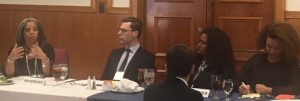Student Summary: Tam
Summary from a Student: IIPSJ Roundtable: The Aftermath of In re Tam
- Alexis Harrison, rising 2L, Howard University School of Law
This panel discussion included the following speakers; Phillip Hampton, senior counsel at Haynes & Boone 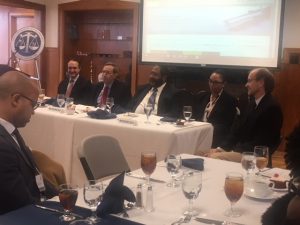 LLP; Toni Hickey, Deputy General Counsel & Chief IP Counsel at Cummins, Inc.; William Thomashower, counsel at Pryor Cashman LLP and; Douglas A. Rettew, partner at Finnegan, Henderson, Farabow, Garrett & Dunner, LLP. It was moderated by Stephen McJohn, a professor at Suffolk University School of Law. The discussion centered around the implications arising from the holding of In Re Tam. Here the Court reversed its course, holding that it is unconstitutional for the Patent and Trademark Office to deny the registration of disparaging content. Attorney Thomashower compared the effect of the opinion to the opening of the Pandora’s box. He is also concerned that the opinion made no mention of a chilling effect in disallowing disparaging content from being registered, while still permitting its use. Another critique found it unfortunate that the Court also did not mention the level of scrutiny used in the opinion.
LLP; Toni Hickey, Deputy General Counsel & Chief IP Counsel at Cummins, Inc.; William Thomashower, counsel at Pryor Cashman LLP and; Douglas A. Rettew, partner at Finnegan, Henderson, Farabow, Garrett & Dunner, LLP. It was moderated by Stephen McJohn, a professor at Suffolk University School of Law. The discussion centered around the implications arising from the holding of In Re Tam. Here the Court reversed its course, holding that it is unconstitutional for the Patent and Trademark Office to deny the registration of disparaging content. Attorney Thomashower compared the effect of the opinion to the opening of the Pandora’s box. He is also concerned that the opinion made no mention of a chilling effect in disallowing disparaging content from being registered, while still permitting its use. Another critique found it unfortunate that the Court also did not mention the level of scrutiny used in the opinion.
Another effect described is the registration of distasteful content in order to limit their use and abuse by other inciting or hateful groups. However, attorney Hickey countered that this would pose a difficult challenge for communities and populations of people that do not have the financial resources to pursue this method of reclaiming distasteful or hateful content. Additionally, attorney Hickey described the impact of the opinion for the average citizen. There is no longer a reliable standard for citizens to consider in determining immoral content.
When asked to consider legislative solutions to the opinion, the panelists concluded that a fix from this branch of government is unlikely and erroneous. Instead, attorney Thomashower described the role of the courts. The objective test should be applied by judges to determine the standard for disparaging content. This is not censorship he argued, because the government has a genuine interest in restricting the registration of content which could lead to a dangerous or inciting result. Nonetheless, attorney Hampton emphasized that the Trademark Office is still pretty conservative, and thus there is an initial layer of bias with the examiners.
Student Summary: Entertainment
Summary from a Student: Entertainment Law Update: Developments in Trademark and Right of Publicity Law
- Lauren J. Walker, rising 3L, Howard University School of Law
The laws surrounding trademark and rights of publicity are developing as intellectual property laws continues to advance. Jonathan Goins and Benita Collier, professionals in the intellectual property sphere shared their expertise on the law and its relationship to the entertainment industry. The panel opened with a Top 10 list of issues that are currently prevalent within media and entertainment law. The issues from the perspective of the brand owner ranged from Trademark Infringement, Trademark Advertising and Federalization of Trade Secret Laws. On the contrary, from the perspective of the individual being accused of infringement the popular issues were Fair Use and the use of the mark in relation to one’s First Amendment rights.
Jonathan Goins is currently a partner at the Atlanta office of Lewis Brisbois Bisgaard & Smith, LLP where he is a member of the firms Intellectual Property & Technology and Entertainment, Media & Sports Practices. With over 15 years of legal experience, Goins has been identified as a leader in Intellectual Property Law.
Bernita Collier is Associate General Counsel at Urban One. In this role she manages intellectual property for four different major media markets. In managing these markers her responsibilities are distributed amongst radio, digital, and television.
Two of the landmark cases that were referenced during the panel were Twentieth Century Fox Television v. Empire Distribution and Curtis Jackson v. William Roberts. In Empire, the question before the court is whether the use of Empire Records was infringement under the Lanham Act and trademark law. The court found that the use of the record distribution company that previously existed and slightly parallels the portrayed record company in a television show would not cause consumer confusion and would not be trademark infringement. On the contrary, in Jackson the question presently before the court is whether the actual usage of popular rapper 50 Cent’s (Curtis Jackson) voice in rapper Rick Ross’s (William Roberts) song is copyright and right of publicity infringement. The use of Jackson’s voice is 19 seconds in a 3-minute song so the court will need to address whether the use of the voice from a song that has a copyright constitutes copyright infringement and is not fair use. Additionally the court will decide whether this use is a violation of Jackson’s right of publicity since this song will likely be sold and Roberts may earn financial gain.
Panelists Goins and Collier established that no celebrity is exempt from intellectual property lawsuits. Entertainer Beyonce Knowles was recently sued by a Russian artist for the use of her voice in Beyonce’s song. The court found in favor of Knowles for di minimus use and First Amendment Fair Use.
To close the panel each panelist discussed the array of issues that they may handle during the day given their roles but shared the importance of staying up to date with the law as it develops, the need to have a good relationship and open communication among all parties, and the importance of correctly advising your client.
Student Summary: Music
Summary from a Student: Music Sampling, Fair Use, and Social Justice
- Anthony Williams, rising 2L, Howard University School of Law
This session was a panel discussion with Lita Rosario (President & CEO - WYZ Girl Entertainment Consulting, LLC), Chanelle Hardy (Strategy Partnerships and Outreach – Google), and Dylan Gilbert (Policy Fellow - Public Knowledge); moderated by Kimberly Tignor (Public Policy Director - Lawyers’ Committee for Civil Rights Under Law). Panelists discussed the complicated relationship between music sampling, the Fair Use standard, and how to utilize the Fair Use standard as a tool for Social Justice. Attorney Hardy spoke to the imbalance that people of color face when dealing with copyright law enforcement. Specifically, suits for copyright infringement are brought against people of color at higher rates than their Caucasian counterparts. Additionally, people of color have lower success rates in asserted claims of copyright infringement.
Attorney Gilbert transitioned to how there needs to be legislation outlining a specific Fair Use standard. The Fair Use standard allows an individual to use copyrighted materials as long as it is not a substantial amount and for a transformative purpose. However, courts vary in deciding what qualifies as fair use. There is no law in the United States that expressly dictates how many seconds of a copyrighted sound recording an artist can use. Hip-Hop artists are particularly susceptible to the lack of consistent Fair Use guidelines, as Hip-Hop music relies heavily on music sampling. In response, Attorney Rosario emphasized this point by discussing a technique used a lot in Hip-Hop called looping, in which a composer takes a part of an instrumental and loops it multiple times to create a new sound. Although this technique essentially creates a new composition, nevertheless suits against Hip-Hop artists are initiated at disproportionate rates due to the inconsistency. For example in Bridgeport Music v. Dimension Films, rap group N.W.A was told that a music license was mandatory to use a sample, but in the Salsoul v. Madonna, Pop singer Madonna was allowed to use copyrighted material deemed de minimis or so trivial that it was not a violation of copyright infringement.
In the final segment, Attorney Rosario offered an interesting perspective on advocating for stronger copyright laws and a definitive fair use standard. Attorney Rosario represents some older musicians, whose primary source of income is through music sampling. Without stronger copyright protections these artists are unable to generate income as they are unable to tour or put out new music. Social justice advocacy takes many different forms and it was highly informative to learn about opportunities to advocate in the intellectual property realm.
Student Summary: Counterfeiting
Summary from a Student: Counterfeiting: Ways to Combat
- Iesha Summerall, rising 3L, Howard University School of Law
This session was presented by Toni Y. Hickey, the Deputy General Counsel & Chief IP Counsel at Cummins, Inc., a Fortune 500 company and Robert “Bob” J. Kenney, Partner at the one of the nation’s highest ranked IP firms—Birch, Stewart, Kolasch & Birch, LLP.
The presenters began the session by discussing what a counterfeit is and why it occurs. Bob explained that those who engage in counterfeiting make fake replicas of a real product. These replicas are produced with the intent of taking advantage of the superior value of the imitated product.
Counterfeiting can take place in each area of IP—tampering with patented products, passing off trademarks, and pirating copyrights. Toni and Bob also explained that sometimes the counterfeit product is not counterfeit because it is fake, but counterfeit because it is imported from another country without the permission of the intellectual property owner. These products are known as gray market goods.
After discussing what a counterfeit is and why it occurs, Bob and Toni discussed the social justice and business issues that occur as a result of counterfeiting. As a societal concern, defective or inferior goods can seriously injure and even kill consumers, advertently or inadvertently. Toni gave an example of counterfeiting that could affect health. When tampering with a pharmaceutical patent, a counterfeiter can remove the active ingredient from a drug, causing the drug to be completely ineffective. Bob also described how a tech defect in a counterfeit cell phone battery has caused serious injury in the past because it blew up while the consumer was using their cell phone. Another serious societal issue is that counterfeit products are used to support and fund terrorism, organized crime, and sex and drug trafficking.
Business issues that arise as a result of counterfeiting include the counterfeit goods harming the reputation of the trademark or the brand of a product. Counterfeit goods also cannibalize sales from the imitated goods and cause manufacturers to spend millions in resources on anti-counterfeiting efforts and regulation.
Combatting counterfeits can require different approaches and strategy, depending on a firm’s makeup. Toni offered her perspective of combating counterfeiting as in-house counsel and Bob offered his perspective as a partner in a mid-sized firm. One way firms can combat counterfeit goods is to record important marks with the Customs organizations globally. As in-house counsel, Toni further noted that in-house can make efforts to know how their products get to market and record with the appropriate Customs organization. This would make the counterfeit products easier to track before they enter the market. Generally, in order to combat counterfeits, any firm or company should always know the main problem areas and where most of the counterfeit products come from. Additionally, consumers can combat counterfeiting by refusing to purchase inauthentic goods. All in all, it was very interesting to learn the different effects of counterfeiting and how to combat them in the legal profession.
15th anniversary
April 8, 2018Uncategorized,IIPSJ
Celebrating 15 Years
of Intellectual Property &
Social Justice CLE
“The IP and Social Justice CLE Program was established and has been sustained by members of the Bench, Bar, and corporate and institutional supporters who envision the principles of access, inclusion, and empowerment as inherent to the social function of IP protection. This annual exploration of cutting edge developments in IP law, informed by consideration of social justice issues, is fittingly enriched by the most consistently diverse congregation of CLE IP faculty and attendees in the nation. It is a privilege to be a part of this enduring, collaborative effort to assist IP lawyers in achieving the Houstonian professional equipoise of technical proficiency in service to the greater societal good.”
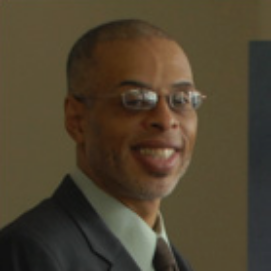 - Professor Lateef Mtima
- Professor Lateef Mtima
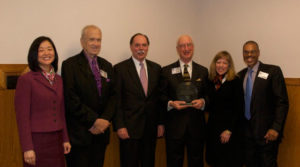
Much of Howard University’s history is about courageous people who put their lives on the line to open the door to opportunity not just for some people but for all. Intellectual property is all about opportunity and the protection of individual rights—opportunity based not on your ethnicity or your sexual preference, or the color of your skin, your religious beliefs, or your station in life, but instead on your creativity, your ingenuity, your intellect, and your abilities. Intellectual property is about opportunity and protecting the creative rights of all people, whoever they might be. In that sense, intellectual property has much in common with the struggle for social justice. I congratulate Howard University and Professor Lateef Mtima, the Founder and Director of the Institute for Intellectual Property and Social Justice, for fifteen years of excellence in educating the future leaders of the intellectual property bar. – Judge Richard Linn
Thoughts from Those There at the Beginning
Read more about the start of the CLE program here.
15 years ago, Howard University School of Law was pretty much an unknown on the IP front. But under the leadership of Professor Mtima and others at Howard, the IP and Social Justice CLE was inaugurated. Outside lawyers and distinguished members of the Judiciary have volunteered their time to the CLE to greatly increase the IP profile of Howard. For me, it has been enormously satisfying to watch this growth. May it continue. – Thomas Irving
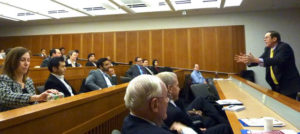
From inspirational vision of Professor Mtima and so many others at Howard University School of Law, we celebrate the 15th Anniversary of IIPSJ’s Annual IP and Social Justice conference. The conference has benefitted from the staunch support of judges, corporate counsels, outside counsels, and of course the fabulous Howard law students. It has been an absolute privilege and honor serving as the Chair of this conference and witnessing its growth over the years. Congratulations on the 15th Anniversary! – Esther Lim
I had the honor of being part of the creation of the Institute and the many wonderful “firsts” - the first CLE program, The first internship at Finnegan Henderson, the first special edition of the law journal, the first visit to the chambers of the CAFC, the first WIPO attendance etc. - It was a tremendous amount of work for an ever evolving cause with countless unanticipated rewards that flow-through my career and life. In fifteen short years, Institute has had an immeasurable impact on a macro and micro level on society, law, lawyers, entrepreneurs, inventors, creators and justice and has enabled me to work to leave a legacy that will inspire future generations. I am forever grateful. – Tameka Simmons
___________________________________________
IP & SOCIAL JUSTICE THROUGH THE YEARS
Through tireless efforts of Prof. Mtima most especially, but also through the supportive and independent efforts of many the others including especially those who have supported and continue to support IIPSJ, the social justice perspective has now worked its way into the very fabric IP discourse and reform at all levels of IP law, policy, advocacy, and administration. I have been most pleased to have been able to contribute to this project for the past 15 years and plan to continue to do so for awhile yet. – Steven Jamar
2007 Intellectual Property and Social Justice Symposium
Introductory Remarks: Applying the Intellectual Property Law in the Public Interest: Copyrights And the Public Use of Software
Presentation: Granting Patents Based On Race: The Practitioner’s Role in Shaping Social Policy
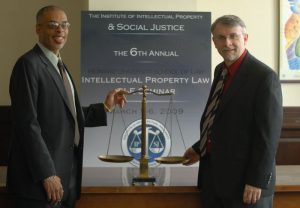
2009 Intellectual Property and Social Justice Symposium Presentation: Where Intellectual Property Theory Meets ‘Outsider’ Jurisprudence–What African-American Cultural Production Can Teach IP Policy

2011 Intellectual Property and Social Justice Symposium Presentation: Intellectual Property and the Pursuit of Civil Rights: Issues & Challenges for the Digital Information Age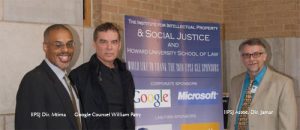
2014 Intellectual Property and Social Justice Luncheon Presentation: Intellectual Property Social Justice: Civil Rights and Economic Empowerment in the 21st
It has been my honor and privilege to participate in Howard’s IP and Social Justice CLE for more than ten years. This is the only CLE of which I am aware that is focused on highlighting the intersection of intellectual property and social justice. It is through this CLE and other work that IIPSJ demonstrates a commitment to ensuring equal access to our intellectual property systems, domestically and abroad. - Toni Y. Hickey
2017 Intellectual Property and Social Justice Luncheon Keynote: Property, Intellectual Property, and Social Justice: Mapping the Next Frontier
CLE Impact & Opportunities
The CLE programs help HUSL alumni and other practitioners develop and maintain expertise in IP practice and provide opportunities for experienced minority IP lawyers to demonstrate their expertise to an audience they might not otherwise reach. The CLE programs also provide networking opportunities for lawyers from diverse groups including attorneys from private practice, from government, from the judiciary, and from academia.
Having attended Howard University School of Law and entered into the IP profession as a patent attorney prior to the establishment of the IP & Social Justice CLE Program, I am so very honored and proud to see the impact that it has had on the students and the IP community as a whole by providing opportunities that previously were hard to come by or not available at all for diverse lawyers in IP law. – Jennifer M. Hayes
As a proud member of the class of 2005… I continue to take pride in this program as an essential element of my continuing legal education. The CLE is uniquely rooted in Howard’s mission of social justice, offering invaluable insights from esteemed members of the bar and bench. I am honored to join the 15th year of this program, and I look forward to returning for many years to come. – Idris McKelvey
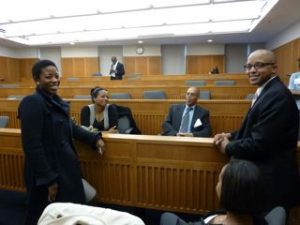
The IIPSJ CLE event has been essential in helping to direct the trajectory of my career. Every year I have participated, through the various modules and panel discussions, I walked away with a solid grasp of the current trends in the profession. Moreover, I emerged with an understanding of the future direction of the profession. Thus, I have been able to align my professional experiences with the ever evolving field of Intellectual Property. – Ulysses Williams
I came to Howard Law School with the intent to use my law degree to effect change... Attending the IP & Social Justice CLE program ... I gained a clearer understanding of the intellectual property-related social justice issues not only concerning disenfranchised people in the United States, but around the world. It is an invaluable program and service to the larger community. – Aisha (Williams) Cassis
Prior to attending law school, I spent more than a decade in the biotechnology arena as a scientist. When I entered Howard University School of Law in 2013, I knew that I wanted to be a patent attorney, however, I did not have a strong network of mentors in the patent field. I quickly joined the Howard University School of Law, Intellectual Property Student Association, and benefited from the mentorship of Professor Lateef Mtima. By attending the IP & Social Justice CLE Program each year, I was afforded the unparalleled opportunity to forge new mentoring relationships with practicing attorneys in the IP arena, and learn about emerging IP issues. This unique experience helped guide my career and continues to do so. Currently, I am a second year associate at Finnegan, Henderson, Farabow, Garrett & Dunner, LLP. – Candice R. Jones
Phil Hampton has graciously volunteered his time to participate in the CLE every year.
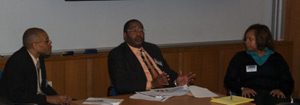
As a student here I benefited from mentoring by Professor Mtima and participation in the CLE, and soon found my passion in the practice of trademark law. By participating as an attorney, I am able to stay up to date and involved with issues of intellectual property and social justice; while continuing the tradition of mentoring the students I meet each year. Congratulations on 15 years and I look forward to the next 15 and many more! – Tashia Bunch
Fair Use & Creative Control
Copyright in the Community: From Fair Use to Creative Control
This month we’d like to discuss some updates in the area of fair use and also invite you to the official launch of Creative Control, the IP community education and pro bono advice initiative.
What is Fair Use?
Fair use is a legal doctrine within the copyright law that allows the public to use copyrighted works and material without the permission of the copyright owner. The fundamental social purpose of copyright protection is to promote the progress of the arts and sciences: to advance American learning and culture by encouraging authors and other creators to share their works with the public. Consequently, copyright reserves to authors only certain specific uses of their works, such as making a copy, while all other uses, such as reading a book aloud as a bed-time story, are freely available to the public. In addition, fair use allows the public to also engage in the authors’ reserved uses, typically referred to as the authors’ exclusive rights, when allowing the activity promotes the social purpose of copyright.
For example, while making a copy of a work is an exclusive right, it would undermine the purpose of copyright if authors could always control whether their work, or any part of their work, can be copied. Without the fair use doctrine, the author of a news article or a history book could prevent a teacher from copying any part of a copyrighted work for use in a classroom discussion. Similar uses by the public, such as reproducing works for purpose of literary or public criticism or social activism, or reproducing portions or aspects of works to create new works such as “fan fiction”, are other activities that are dependent upon fair use.
Fair Use Recent Court Decisions
Some recent court decisions demonstrate the importance of fair use to the creation of new works and art forms and to free speech. In Drake Winning Sampling Case Over Fair Use Is Big News... But Still Demonstrates The Madness Of Music Licensing, Mike Masnick discusses how courts are reevaluating hip-hop sampling as fair use of portions of pre-existing music. In Reaction video YouTubers win landmark ‘fair use’ copyright case in the US,” Heather Gay discusses how a court recently held that a YouTube “reaction video”, video wherein viewers of various Internet videos share their opinions of these works, was protected by fair use.
For more information on how courts have applied fair use, visit the Fair Use Index on the U.S. Copyright Office website. The index is a searchable database of court decisions on fair use compiled to aid the public in understanding the types of uses that have previously been determined to be fair use. For more information on criticism and commentary as fair use, check out “Copy This Podcast Episode 9: Parody Isn’t Always a Laughing Matter.”
Fair Use and Halloween (and other uses…)
In light of the past week’s festivities, you might find interesting a recent op-ed by Joshua Lamel, Fair Use and Halloween, which discusses how fair use supports this All Hallowed American pastime.
Is there an IP social justice development or issue that you think might interest other IIPSJ readers? Please let us know - and as always, we look forward to your comments and questions.
IIPSJ
Creative Control
The Lawyers’ Committee invites you to the launch of Creative Control - an initiative to elevate and empower online expression. The event will feature local DC artists, thought leaders on protecting your creative works, and one-on-one free advice with attorneys.
The event takes place Thursday, November 16 from 7 -10 pm at RedRocks on H St in NE DC.
Other Programs
Other IIPSJ Education and Outreach Programs
From its inception in 2002, IIPSJ has conducted programs to reach out to the bench and bar and to government officials through workshops and seminars as well as through participation in professional organizations such as the Giles Rich Inn of Court and the American Intellectual Property Association. One of IIPSJ's earliest conferences was a continuing legal education program designed for lawyers and judges. The CLE has been done annually ever since.
Over the years IIPSJ has sponsored or participated in various outreach initiatives and programs to educate undergraduates and community members about IP and its opportunities. This aspect continues to grow through partnering with the NAACP, the USPTO, Sramani, and with other organizations for particular programs. Below is information on current and some past programs that IIPSJ has sponsored or participated in.
Net Neutrality
Over the summer, you likely noticed an increase in webpages and social media posts on Net Neutrality. And when you visited various webpages on July 12 you may have seen ads supporting the Internet wide day of action to save net neutrality.
IP Symposium: Best Practices in Rights Clearance
January 8, 2018Uncategorized,IIPSJ
As we all welcome the New Year IIPSJ continues its collaborative work in community IP education and empowerment initiatives as a co-sponsor of
Presented by the Center for Protection of Intellectual Property at the Anton Scalia Law School at George Mason University, on Thursday, January 18, 2018, beginning at 1pm.
This symposium will bring together scholars, industry representatives, and visual artists to discuss when and whether rights need to be cleared when using the work of others. During the networking reception to follow, students from the Arts & Entertainment Advocacy Clinic at the Scalia Law School will be available to consult one-on-one with attendees about copyright questions they may have and to otherwise facilitate further consultation with the Washington Area Lawyers for the Arts and other Volunteer Lawyers for the Arts organizations.
Please visit the link here at Center's website for further information and to register for the Symposium.
International IP
November 17, 2017Uncategorized,Federal
1. Copyright Implications of Renegotiating the North American Free Trade Agreement (“NAFTA”) – In May 2017, the United States Trade Representative (“USTR”) published a request for comments on the Trump administration objectives for renegotiation of NAFTA. Here are links that discuss some of the comments submitted on copyright and social justice concerns.
Re:Create Coalition: What They’re Saying: Protecting A Balanced Copyright System In NAFTA Renegotiations
Program on Information Justice and Intellectual Property (“PIJIP”): Copyright Balance as a NAFTA Negotiating Objective: Testimony to the Trade Policy Staff Committee
Creative Commons: Is Re-negotiating NAFTA Opening Pandora’s Box?
2. Updates on the Marrakesh (“Books for the Blind”) Treaty – In May we included an article announcing that the Electronic Information for Libraries (“EIFL”) library guide to the Marrakesh Treaty for persons with print disabilities is now available six languages: English, French, Lithuanian, Russian, Serbian, and Nepali. This month we bring some links for background on the treaty as well as an update on the status in the EU.
World Intellectual Property Organization (“WIPO”): The Marrakesh Treaty In Action
WIPO: Stevie Wonder to UN Member States: Help Others Beat the Odds Like I Did, Join Marrakesh Treaty
Intellectual Property Watch: EU Parliament Adopts Marrakesh Treaty; Blind Union Prepared To Fight Publisher ‘Compensation’
3. Copyright Reform in South Africa - The South African Parliament published a pending Bill amending the Copyright Act and a request for comments. Click here to read the pending Bill.
IP Watch: Lessons From South Africa: Protecting Non-Expressive Uses In Copyright Reform
Infojustice: Comments on South Africa's Copyright Amendment Bill (B13-2017)
4. Other Articles of Interest
Infojustice, reposted from EIFL: Course Packs for Education Ruled Legal in India
Public Knowledge: Net Neutrality Challenges in the World: Zero-Rating in the European Union
Reposted by Infojustice: German Federal Court of Justice Grants Compulsory License in Preliminary Proceedings
IIPSJ

